Allergies are common and can affect anyone, regardless of age and gender. They occur when your immune system reacts to substances that are normally harmless. Allergies can affect different parts of your body, including your eyes.
Eye allergies, also known as allergic conjunctivitis, occur when your eyes come into contact with allergens, such as pollen, dust mites, pet dander, or mold spores. This can lead to inflammation of the conjunctiva, which is the thin, transparent layer of tissue that lines the inside of your eyelids and covers the white part of your eye.
Symptoms of Eye Allergies
The symptoms of eye allergies can vary from person to person. Some people may only experience mild symptoms, while others may have severe reactions. Common symptoms of eye allergies include:.
- Redness
- Itching
- Watering
- Burning
- Irritation
- Sensitivity to light
In some cases, eye allergies can also cause blurred vision or puffy eyelids. If you experience any of these symptoms, it is important to see an eye doctor. They can help determine if your symptoms are caused by allergies or something else.
Treatment for Eye Allergies
The most effective way to treat eye allergies is to avoid the allergens that trigger them. This may mean staying indoors during peak pollen season, using a dust mite cover on your mattress and pillows, or avoiding contact with pets.
If avoidance is not possible, there are several over-the-counter and prescription medications that can help relieve the symptoms of eye allergies, including:.
- Antihistamines: These medications help block the release of histamine, which is a chemical that causes itching, swelling, and other allergy symptoms. Antihistamines are available as eye drops, tablets, or nasal sprays.
- Mast cell stabilizers: These medications help prevent the release of histamine and other allergy-triggering chemicals. They are available as eye drops.
- Nonsteroidal anti-inflammatory drugs (NSAIDs): These medications help reduce inflammation and relieve pain. They are available as eye drops.
- Steroids: These medications are very effective at reducing inflammation, but they can have side effects and are usually only used for severe cases of eye allergies. They are available as eye drops or ointments.
It is important to talk to your eye doctor before using any medications, especially if you have other medical conditions or are taking other medications. Your eye doctor can help determine which medication is right for you and how often to use it.
Prevention of Eye Allergies
The best way to prevent eye allergies is to avoid the allergens that trigger them. This may mean making changes to your home environment, such as using an air purifier, vacuuming and dusting regularly, and washing your bedding and curtains in hot water.
Other tips to help prevent eye allergies include:.
- Keeping windows and doors closed during peak pollen season
- Wearing sunglasses to protect your eyes from pollen and other allergens
- Washing your hands frequently to avoid spreading allergens to your eyes
- Avoiding rubbing your eyes, as this can make symptoms worse
If you have a known allergy, it is also important to carry any necessary medications with you, such as eye drops or antihistamines, in case of an allergic reaction.
When to See an Eye Doctor
If you experience any of the symptoms of eye allergies, it is important to see an eye doctor. They can help determine the cause of your symptoms and recommend the best course of treatment.
You should also see an eye doctor if your symptoms do not improve with treatment or if you experience any of the following:.
- Pain or discomfort in your eyes
- Decreased vision
- Changes in your vision
- Severe or persistent symptoms
- Eye discharge or crusting
These symptoms may indicate a more serious eye condition that requires prompt medical attention.



























